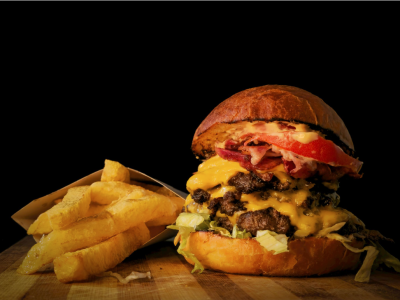Are microplastics hiding in your favorite fast food? Find out!
By
Aubrey Razon
- Replies 0
A recent study has revealed a surprising discovery in popular fast food. Microplastics have been found in some of America’s favorite meals, sparking concerns about health risks.
Could this hidden danger be affecting you?
The study, conducted by the group PlasticList, tested a wide array of foods from restaurant chains and grocery stores, revealing that microplastics, specifically phthalates, are more prevalent in our diets than many of us might have imagined.
Sweetgreen's Chicken Pesto Parm Salad and Starbucks' Matcha Latte topped the list with the highest levels of these harmful chemicals, followed closely by other popular items like Shake Shack's cheeseburger and Burger King's Whopper with Cheese.

Phthalates, often referred to as “forever chemicals”, are used to make plastics more flexible and durable.
However, once they enter our bodies, they do not break down, potentially leading to a host of health issues, including hormone disruption and increased risks of cancer and autism.
The study's methodology was rigorous, with 775 samples of 312 foods tested for plastic chemicals.
To ensure accuracy, all products were sent to a vetted testing lab in their original packaging to prevent contamination.
The presence of microplastics in food is particularly concerning for those of us in the over-60s age group.
As we age, our bodies may not be as resilient in processing and eliminating toxins.
Phthalates have been linked to a range of health problems, including endocrine disruption, which can mimic or interfere with the body's hormones.
This can lead to fertility issues, developmental problems, and increased cancer risk.
Moreover, the study also tested for bisphenol A (BPA), another industrial chemical used in plastics and aluminum cans.
BPA exposure has been associated with neurological and behavioral changes, including those related to autism.
Alarmingly, certain food items tested exceeded the European Food Safety Authority (EFSA) intake limits for BPA by staggering amounts.
Despite the concerning findings, all the foods tested were deemed safe to eat according to current FDA, EPA, and EFSA standards for chemical content in foods.
However, the researchers from PlasticList argue that these safety limits may be outdated and not reflective of the latest scientific understanding of plastic toxicity.
The European Chemical Agency has noted that several phthalates may damage fertility or the unborn child and interfere with the hormonal system.
The Agency for Toxic Substances and Disease Registry has also highlighted the potential for DEHP to cause liver cancer in animals, as well as damage to the reproductive and other vital systems.
As members of The GrayVine community, it's essential to stay informed and take proactive steps to protect our health:
1. Minimize consumption of fast food items, especially those identified with high levels of microplastics.
2. Opt for fresh, unpackaged foods when possible, as these are less likely to contain phthalates and BPA.
3. Use glass or stainless steel containers for food storage instead of plastic to reduce exposure to these chemicals.
4. Advocate for updated safety standards that reflect current scientific knowledge about the health risks of microplastics.
Remember, while the convenience of fast food is tempting, the potential health risks of microplastics are a reminder to be mindful of what we consume.
By staying informed and making conscious choices, we can help safeguard our health and enjoy our golden years to the fullest.
 Have you changed your eating habits due to concerns about microplastics? Do you have tips for reducing exposure to these chemicals? Share your thoughts and experiences in the comments below.
Have you changed your eating habits due to concerns about microplastics? Do you have tips for reducing exposure to these chemicals? Share your thoughts and experiences in the comments below.
Could this hidden danger be affecting you?
The study, conducted by the group PlasticList, tested a wide array of foods from restaurant chains and grocery stores, revealing that microplastics, specifically phthalates, are more prevalent in our diets than many of us might have imagined.
Sweetgreen's Chicken Pesto Parm Salad and Starbucks' Matcha Latte topped the list with the highest levels of these harmful chemicals, followed closely by other popular items like Shake Shack's cheeseburger and Burger King's Whopper with Cheese.

Researchers have discovered high levels of phthalates, toxic plastics linked to cancer and autism. Image source: Lucas Porras/Pexels.
Phthalates, often referred to as “forever chemicals”, are used to make plastics more flexible and durable.
However, once they enter our bodies, they do not break down, potentially leading to a host of health issues, including hormone disruption and increased risks of cancer and autism.
The study's methodology was rigorous, with 775 samples of 312 foods tested for plastic chemicals.
To ensure accuracy, all products were sent to a vetted testing lab in their original packaging to prevent contamination.
The presence of microplastics in food is particularly concerning for those of us in the over-60s age group.
As we age, our bodies may not be as resilient in processing and eliminating toxins.
Phthalates have been linked to a range of health problems, including endocrine disruption, which can mimic or interfere with the body's hormones.
This can lead to fertility issues, developmental problems, and increased cancer risk.
Moreover, the study also tested for bisphenol A (BPA), another industrial chemical used in plastics and aluminum cans.
BPA exposure has been associated with neurological and behavioral changes, including those related to autism.
Alarmingly, certain food items tested exceeded the European Food Safety Authority (EFSA) intake limits for BPA by staggering amounts.
Despite the concerning findings, all the foods tested were deemed safe to eat according to current FDA, EPA, and EFSA standards for chemical content in foods.
However, the researchers from PlasticList argue that these safety limits may be outdated and not reflective of the latest scientific understanding of plastic toxicity.
The European Chemical Agency has noted that several phthalates may damage fertility or the unborn child and interfere with the hormonal system.
The Agency for Toxic Substances and Disease Registry has also highlighted the potential for DEHP to cause liver cancer in animals, as well as damage to the reproductive and other vital systems.
As members of The GrayVine community, it's essential to stay informed and take proactive steps to protect our health:
1. Minimize consumption of fast food items, especially those identified with high levels of microplastics.
2. Opt for fresh, unpackaged foods when possible, as these are less likely to contain phthalates and BPA.
3. Use glass or stainless steel containers for food storage instead of plastic to reduce exposure to these chemicals.
4. Advocate for updated safety standards that reflect current scientific knowledge about the health risks of microplastics.
Remember, while the convenience of fast food is tempting, the potential health risks of microplastics are a reminder to be mindful of what we consume.
By staying informed and making conscious choices, we can help safeguard our health and enjoy our golden years to the fullest.
Key Takeaways
- Researchers have discovered high levels of phthalates, toxic plastics linked to cancer and autism, in popular fast food items from Sweetgreen and Starbucks, among others.
- Sweetgreen's Chicken Pesto Parm Salad and Starbucks' matcha latte contained the highest amounts of phthalates, with other fast food products like Shake Shack's cheeseburger also ranking poorly.
- A study found boys exposed to BPA in the womb were significantly more likely to be diagnosed with autism, with Sweetgreen's salad and Taco Bell's Cantina Chicken Burrito showing high concentrations of phthalates.
- Despite current food safety standards deeming these levels as “safe”, experts and researchers are concerned that the safety limits for plastic chemicals are outdated and may be inadequately protecting consumers, especially toddlers and pregnant individuals.






